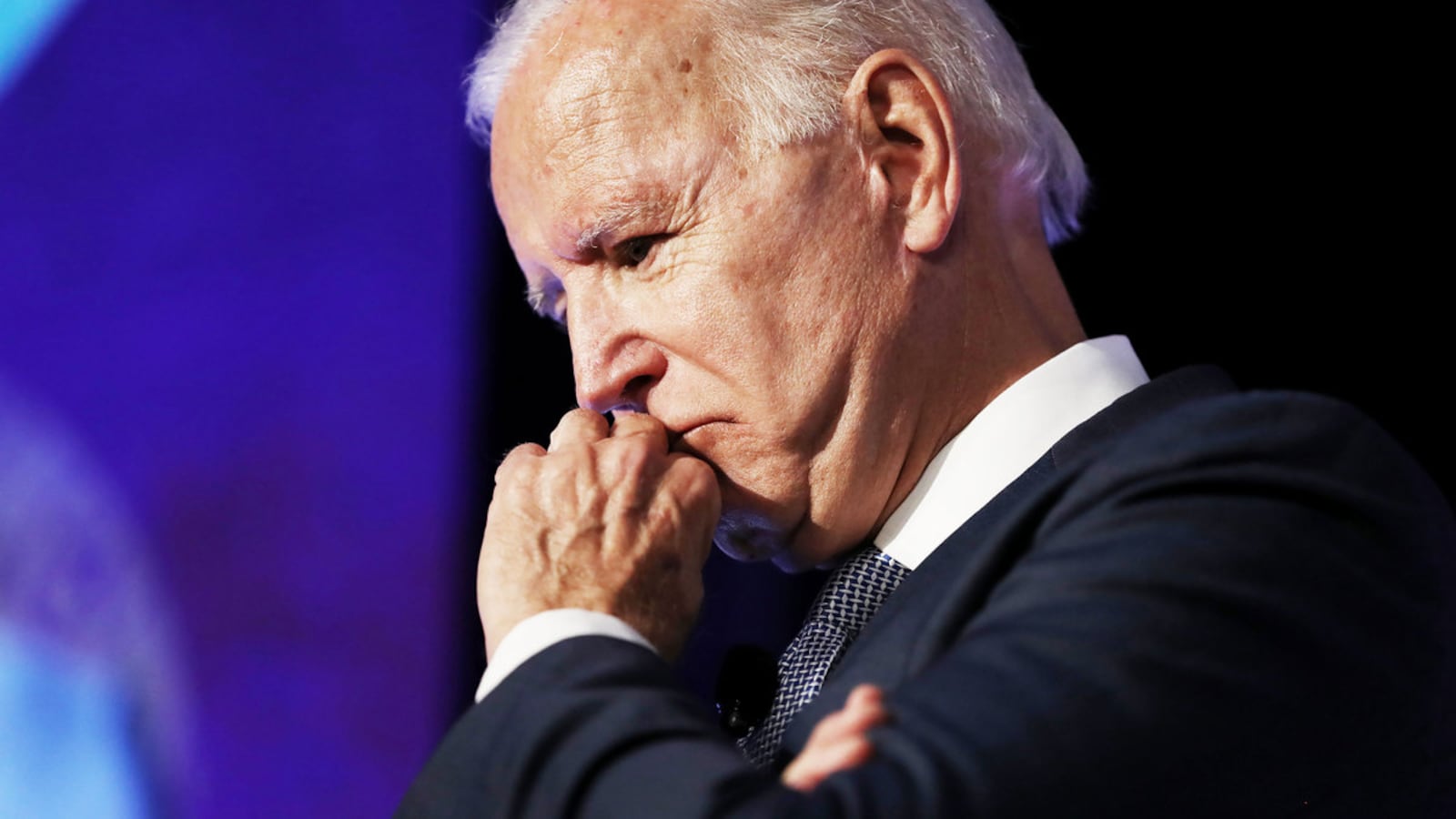The problem with being a president who promises to clean things up after a villainous predecessor is that the press corps treats you like a superhero—which sounds like a good thing until you realize that just means you get blamed for things you can’t control.
That’s what happened to Jimmy Carter, and it’s what’s happening to Joe Biden now thanks to what Dartmouth political scientist Brendan Nyhan has called “the Green Lantern Theory” in which voters believe a president can do anything through sheer willpower, like the DC superhero.
That mistaken belief, says Nyhan, leads to the belief that legislative failures result from a lack of will. Nyhan cites the $1.9 trillion American Rescue Plan Biden signed into law earlier this year, “the most significant piece of legislation passed for working families in many, many decades.” When one of Biden’s core promises, the $15-an-hour wage, failed to make the final bill, progressives argued that Biden didn’t fight hard enough.
An analysis of media coverage using algorithms focused on adjectives and where they’re placed in reporting found that Biden got treated as badly or worse in his first year as president than his predecessor, who routinely lied to the American people, delighted in violating democratic norms, and used a fascistic term for reporters, calling them “enemies of the people.”
The study used artificial intelligence to scan the coverage in a “sentiment analysis” that bears out what the White House is up against. Simply put, Biden can’t catch a break. He’s signed two consequential pieces of legislation into law with a third possible by the end of the year, and that’s with razor-thin margins in Congress.
Biden has done a better job containing COVID than his predecessor, whose flagrant refusal to self-isolate after he was secretly found to test positive put hundreds of people at risk unnecessarily. White House Chief of staff Ron Klain tweeted out Washington Post columnist Dana Milbank calling on the media to be “partisans for democracy” instead of being as adversarial with a president trying to pass a bill as they were with the guy who is still trying to overthrow the election.
“We expected Biden to return us to normality and it hasn’t happened. It’s not necessarily his fault, but people aren’t grading on a curve,” says Jack Pitney, a professor of American politics at Claremont McKenna College. Trump benefited from low expectations, says Pitney, recounting how in early 2017, after watching Trump deliver pretty standard remarks honoring a fallen Navy SEAL, CNN commentator Van Jones enthused that was the moment Trump became president. There were other moments early on, but none endured. “Trump briefly exceeded a low baseline while Biden after a year hasn’t returned us to normalcy.”
A similar phenomenon occurred after Richard Nixon resigned from the presidency in disgrace. After a brief interregnum with Gerald Ford, who was appointed and not elected, there was an expectation that the next president, Jimmy Carter, who promised “a government as good as its people” and that he would never lie, would receive more favorable treatment from the media compared to what Nixon had gotten for committing criminal acts in covering up the break-in of Democratic headquarters at the Watergate hotel.
But when Carter on his first full day in office in 1977 pardoned Vietnam draft dodgers, the Democratic left was unhappy because he did not pardon draft deserters. The Republican right was furious that he pardoned anyone, and Carter didn’t get much credit for a bold move fulfilling a campaign promise—a pattern that we see repeated in Biden’s presidency.
Carter quickly became a punching bag and an object of some ridicule epitomized in the killer rabbit episode that’s funny in retrospect but was enormously politically damaging in 1979, portraying Carter as weak and hapless as he was preparing to run for re-election. After what seemed like relentless battering from the press, Jody Powell, Carter’s press secretary, said he had begun to wonder if Richard Nixon had gotten a raw deal. He was only half-joking.
Jonathan Alter, a Daily Beast columnist and author of a new biography of Carter, His Very Best, argues that Carter was made and unmade by Watergate—that he never would have become president without the contrast with Nixon’s scandal, and that his presidency was partly destroyed by the standards of a post-Watergate press corps driven by a finely honed cynicism. Alter recalled in a conversation that Jody Powell famously said, “We didn’t have a honeymoon. We didn’t even have a one-night stand.”
Yet in his first year, Carter never went below 50 percent. He didn’t sink as low as Biden, though he would later go down to 28 percent in the summer of 1979. His early speeches warning of an energy crisis and calling it “the moral equivalent of war” were duds according to New York Times columnist William Safire, who trumpeted the acronym MEOW. Formerly a press counselor in the Nixon White House, Safire wanted to affix a “gate” on every Carter flap.
“The entire press corps took their lead from Safire, who was a Nixon hit man,” says Alter.
After President Reagan was inaugurated, there was a collective sense of stepping back and examining the media’s role. Initially, Reagan held press conferences in the afternoon, and the networks would use their evening broadcasts to point out whatever mistakes he made. The White House retaliated by holding press conferences in the evening in primetime. The public loved it, the mistakes didn’t matter. None of the petty stuff stuck to Reagan, who was dubbed “Teflon” by then Democratic Rep. Pat Schroeder.
With the exception of the purely partisan press, no reporter wants to be seen as “in the tank” for any political figure. Biden’s experience is similar to Carter’s—a more conventional president taking office with a press corps accustomed to a diet of headline-making stories.
“The press corps wants to prove they’re not one-sided and the little miscues that wouldn’t have made the list of a thousand Trump outrages, they beat up on Biden for in the same way they beat up on Carter for things that wouldn’t have made the cut under Nixon,” says Alter.
In the course of writing his book on Carter, Alter says he spoke to a number of reporters from the Carter-Reagan era “who agreed they were too tough on him” and “questioned his motives too much.” The late Jack Germond, a fabled political columnist, wrote in his memoir, Fat Man in a Middle Seat, that Carter was a good man who got a bum rap.
Both Carter and Biden were treated pretty well by the press for the first six months, says Kai Bird, author of the new Carter biography The Outlier. Then reporters began to pound on stories that would fit an editorial theme, he says. For Carter, it was “a bumbling Southern hick who didn’t know the ways of Washington, a guy who paid too much attention to detail and couldn’t see the big picture.”
For Biden, the tipping point was the exit from Afghanistan, a policy Biden had telegraphed for months, even years. “That it was messy was inevitable—but clearly not as messy as staying there for another four years,” says Bird. “But now the press is ignoring these fundamentals and focusing entirely on the theme of incompetence. Very unfair.”
Biden is being subjected to the same charges of incompetence, and not being up to the job, despite having a more consequential first year than any of his recent predecessors.
“And while the press had fun with Carter’s Southern culture,” says Bird, “with Biden it is his age.”
It’s something Biden can’t change anymore than Carter could have changed his Southern accent—not that he wanted to—but it is a reminder that the media seeks out larger-than-life inspirational figures, and so do the American people.






